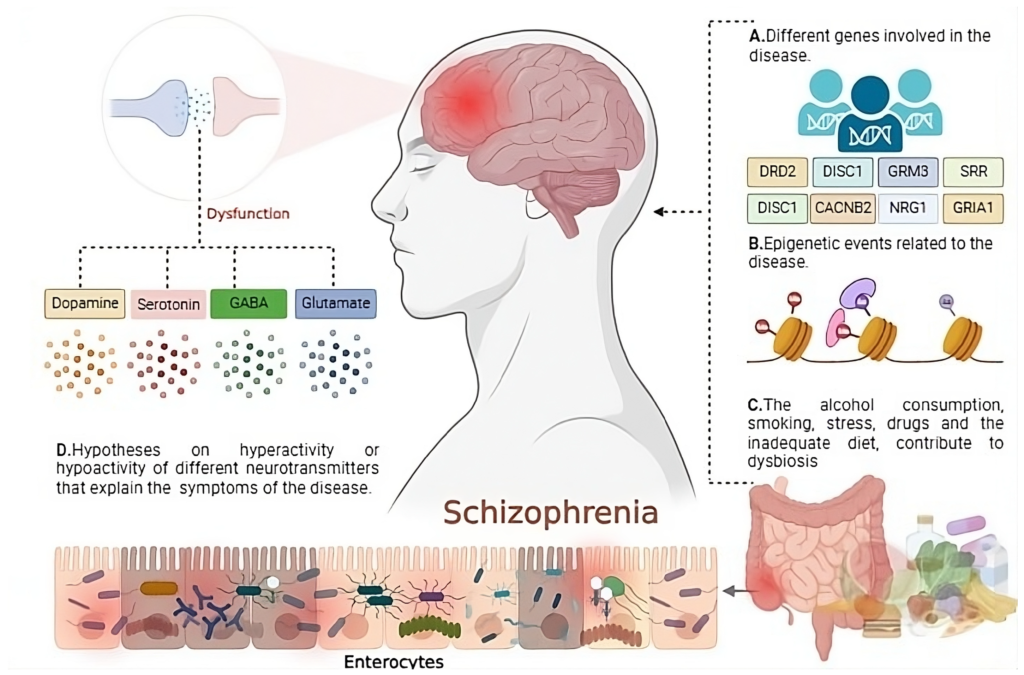
Schizophrenia is a complex and often misunderstood mental health disorder that affects how a person thinks, feels, and behaves. It is a chronic condition that can significantly impact an individual’s ability to function in daily life. Despite its challenges, with proper treatment and support, many people with schizophrenia can lead fulfilling lives. In this deep dive, we’ll explore what schizophrenia is, its causes, symptoms, complications, treatment options, and prognosis.
What is Schizophrenia?
Schizophrenia is a severe mental health disorder characterized by disruptions in thought processes, perceptions, emotional responsiveness, and behavior. It often involves a combination of hallucinations, delusions, and disordered thinking, which can make it difficult for individuals to distinguish between what is real and what is not.
The condition typically emerges in late adolescence or early adulthood, although it can develop at any age. Schizophrenia affects approximately 1% of the global population and can have a profound impact on an individual’s relationships, work, and overall quality of life.
Causes of Schizophrenia
The exact cause of schizophrenia is unknown, but research suggests that it results from a combination of genetic, biological, and environmental factors. Here’s a closer look at these contributing factors:
1. Genetic Factors
- Schizophrenia tends to run in families, indicating a strong genetic component.
- Having a first-degree relative (e.g., parent or sibling) with schizophrenia increases the risk.
2. Brain Chemistry and Structure
- Imbalances in neurotransmitters, such as dopamine and glutamate, may play a role.
- Abnormalities in brain structure, including enlarged ventricles or reduced gray matter, have been observed in individuals with schizophrenia.
3. Environmental Factors
- Prenatal Exposure: Complications during pregnancy or birth, such as infections or malnutrition, may increase the risk.
- Stressful Life Events: Trauma, abuse, or significant life changes can trigger the onset of schizophrenia in vulnerable individuals.
- Substance Use: The use of psychoactive drugs, particularly during adolescence, may contribute to the development of schizophrenia.
Symptoms of Schizophrenia
Schizophrenia symptoms are typically divided into three categories: positive, negative, and cognitive symptoms. These symptoms can vary in severity and may come and go in episodes.
1. Positive Symptoms
These are behaviors or experiences that are added to a person’s normal functioning:
- Hallucinations: Hearing voices or seeing things that aren’t there.
- Delusions: Strongly held false beliefs (e.g., paranoia or grandiosity).
- Disorganized Thinking: Incoherent speech or difficulty organizing thoughts.
- Abnormal Motor Behavior: Agitation, repetitive movements, or catatonia.
2. Negative Symptoms
These involve a loss of normal functioning:
- Reduced Emotional Expression: Flat affect or lack of facial expressions.
- Avolition: Lack of motivation or ability to initiate activities.
- Anhedonia: Inability to experience pleasure.
- Social Withdrawal: Avoiding social interactions and relationships.
3. Cognitive Symptoms
These affect thinking processes:
- Poor Executive Functioning: Difficulty planning or organizing.
- Memory Problems: Trouble with working memory or recalling information.
- Attention Deficits: Difficulty focusing or maintaining attention.
Complications of Schizophrenia
If left untreated or poorly managed, schizophrenia can lead to significant complications, including:
1. Social and Occupational Impairment
- Difficulty maintaining relationships or employment.
- Social isolation and stigma.
2. Physical Health Issues
- Higher risk of obesity, diabetes, and cardiovascular disease due to lifestyle factors and medication side effects.
3. Substance Abuse
- Increased likelihood of alcohol or drug use as a form of self-medication.
4. Suicidal Thoughts and Behaviors
- Individuals with schizophrenia are at a higher risk of suicide, particularly during psychotic episodes.
Treatment Options for Schizophrenia
While there is no cure for schizophrenia, treatment can help manage symptoms and improve quality of life. A comprehensive treatment plan typically includes:
1. Medications
- Antipsychotics: The primary treatment for schizophrenia, these medications help reduce hallucinations, delusions, and disordered thinking. Examples include risperidone, olanzapine, and clozapine.
- Mood Stabilizers or Antidepressants: These may be prescribed to address co-occurring mood disorders.
2. Psychotherapy
- Cognitive Behavioral Therapy (CBT): Helps individuals identify and change negative thought patterns.
- Family Therapy: Educates families about schizophrenia and improves communication and support.
- Social Skills Training: Helps individuals develop and maintain relationships.
3. Psychosocial Interventions
- Supported Employment: Assists individuals in finding and maintaining jobs.
- Housing Assistance: Provides stable living environments.
- Case Management: Coordinates care and access to resources.
4. Lifestyle and Self-Care
- Regular Exercise: Improves physical and mental health.
- Healthy Diet: Supports overall well-being.
- Stress Management: Techniques like mindfulness or meditation can help reduce stress.
Prognosis for Schizophrenia
The prognosis for individuals with schizophrenia varies depending on several factors, including the severity of symptoms, adherence to treatment, and the availability of support. Key points to consider:
1. Chronic but Manageable
Schizophrenia is a lifelong condition, but many individuals can achieve symptom stability with proper treatment and support.
2. Importance of Early Intervention
Early diagnosis and treatment can significantly improve outcomes and reduce the risk of complications.
3. Role of Support Systems
Strong family and community support can enhance recovery and improve quality of life.
4. Advances in Treatment
Ongoing research and advancements in medications and therapies offer hope for better management of schizophrenia in the future.
Conclusion
Schizophrenia is a challenging and complex disorder, but with the right treatment and support, individuals can manage their symptoms and lead meaningful lives. Early intervention, a comprehensive treatment plan, and a supportive environment are key to improving outcomes and reducing the impact of the condition.
If you or a loved one is experiencing symptoms of schizophrenia, seek help from a mental health professional. Remember, schizophrenia is not a life sentence—many people with the condition go on to achieve stability and fulfillment.
We hope this guide has provided valuable insights into schizophrenia. If you have any questions or experiences to share, feel free to leave a comment below. Together, we can build a supportive community for those navigating life with schizophrenia. 💜
